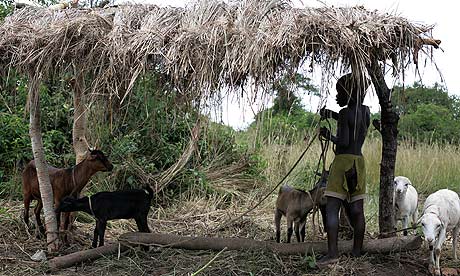
Jacques Diouf, the director general of the Food and Agriculture Organisation (FAO), today opened two days of talks on the challenges that lay ahead for farming over the next 40 years.
Around 300 experts and scientists on agriculture and food security turned up in Rome for the first day of the high level forum on how to feed the world in 2050, which Diouf says was a "reflection of your dedication and commitment not only to the fight against hunger of today, but also to the well-being of future generations".
Proceedings of the event can be watched via an FAO webcast.
The meeting will inform discussions at a three-day world summit on food security due to be attended by heads of state next month.
The aim of this week's forum is to discuss the problems facing security and identify "tangible solutions" to deal with them, said Diouf.
During the first half of this century, agriculture will face several challenges, Diouf told delegates. World population is expected to soar by 34% to 9.1 billion by 2050. The population growth would take place entirely in developing countries and would centre on urban areas, which are predicted to swell by 86%, or by nearly 3 billion people. The rural population is expected to shrink by 18%.
"The combined effect of population growth, strong income growth and urbanisation, with shifts in diet structures towards more nutritious and higher quality food is expected to result in almost the doubling of demand for food, feed and fibre," said Diouf.
Agriculture, he said, would have no choice but to be more productive. "This means the small rural workforce will have to produce more and better from fewer resources to meet demand."
He added that global agriculture will have to cope with the effects of climate change - higher temperatures, greater rainfall and extreme weather conditions. Climate change will also reduce water availability and lead to an increase in pests and diseases.
Farmers in Katine, north-east Uganda, are already suffering from the effects of drought and floods.
Forum delegates, who come from around the world, are expected to debate the investment needs, technologies and policy measures that will be needed to secure the world's food supplies by 2050. The FAO calculates that $44bn a year in aid will need to be invested in agriculture in developing countries - around $7.9bn is currently being spent.
Greater investments from national budgets, foreign direct investment and private sector resources should be made available to fund access to irrigation systems, machinery, storage, more roads and better rural infrastructures, as well as on training farmers.
The FAO said it hopes next month's summit will agree on "the complete and rapid eradication of hunger so that every human being on earth can enjoy the most fundamental of all human rights - the 'right to food' and thus to decent life".







